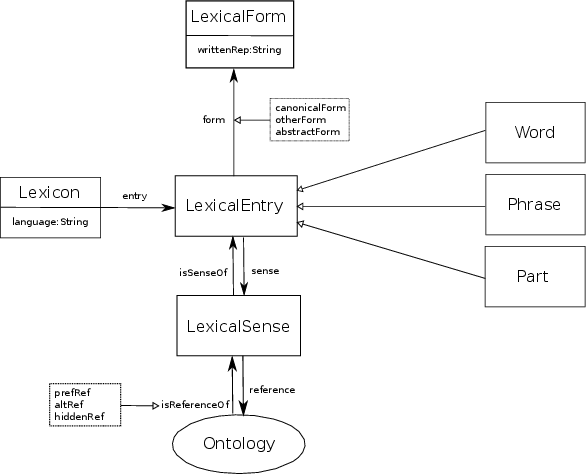Lemon is an RDF model for representing lexical information relative to ontologies. We assume that you are familiar with RDF and Turtle, if not consider reading the tutorial here. Note, that we will use Turtle for this tutorial, however Lemon can also be serialized in any RDF format, such as RDF/XML

For example the lexical entry for a simple word such as ``tuberculosis'' would be as follows:
:tuberculosis lemon:canonicalForm [
lemon:writtenRep "tuberculosis"@en ] ;
lemon:sense [
lemon:reference <http://dbpedia.org/resource/Tuberculosis> ] .
Each lexicon collects all entries for a given language, as such language is normally marked on the lexicon object. e.g.,
:lexicon lemon:language "en" ; lemon:topic <http://dbpedia.org/resource/Disease> ; lemon:entry :tuberculosis , :consumption , :hepatitis .
Note that forms are also by convention marked with a language tag, this tag may be more specific (e.g., "en-GB" for ``UK English'' and "en-fonipa" for ``English IPA'' are allowed in the lexicon above)
Each entry in a lexicon is assumed to have the same part-of-speech class and if it is multi-word the same parse tree. e.g.,
# Derived forms are separate entries
:garlic lemon:canonicalForm [
lemon:writtenRep "garlic"@en ] .
:garlicky lemon:canonicalForm [
lemon:writtenRep "garlicky"@en ] .
# Term variations are separate entries
:garlic_clove lemon:canonicalForm [
lemon:writtenRep "garlic clove"@en ] ;
lemon:sense [
lemon:reference <http://dbpedia.org/resource/Garlic> ] .
:clove_of_garlic lemon:canonicalForm [
lemon:writtenRep "clove of garlic"@en ] ;
lemon:sense [
lenon:reference <http://dbpedia.org/resource/Garlic> ] .
A form may have multiple representations, for example to capture phonetics and spelling variation, however it must always be pronounced the same way. A different form is used for each inflection variant:
:color lemon:canonicalForm [
lemon:writtenRep "color"@en-US ;
lemon:writtenRep "colour"@en-GB ;
lemon:representation "ˈkʌl.ə(ɹ)"@en-fonipa ] ;
lemon:otherForm [
lemon:writtenRep "colors"@en-US ;
lemon:writtenRep "colours"@en-GB ;
lemon:representation "ˈkʌl.əːs"@en-fonipa ] ;
lemon:sense [
lemon:reference <http://dbpedia.org/resource/Color> ] .
The sense object represents a mapping between a lexical entry and an ontology entity. As such, no two lexical entries may have the same sense object, and the sense object should have only one reference, except in the case when the ontology entities are known to be equivalent by a link such as owl:sameAs.
:tuberculosis lemon:canonicalForm [
lemon:writtenRep "tuberculosis"@en ] ;
lemon:sense [
lemon:reference <http://dbpedia.org/resource/Tuberculosis> ] .
# Consumption is an alternative term for tuberculosis, only antiquated.
# The word also has a modern meaning in economics.
:consumption lemon:canonicalForm [
lemon:writtenRep "consumption"@en ] ;
lemon:sense [
lemon:reference <http://dbpedia.org/resource/Tuberculosis> ;
lemon:context :antiquated ] ;
lemon:sense [
lemon:reference <http://dbpedia.org/resource/Consumption_(economics)> ] .
# OK as we know that
# <http://dbpedia.org/resource/Garlic> owl:sameAs
# <http://rdf.freebase.com/ns/m/0dbrl> .
:garlic lemon:canonicalForm [
lemon:writtenRep "garlic"@en ] ;
lemon:sense [
lemon:reference <http://dbpedia.org/resource/Garlic> ,
<http://rdf.freebase.com/ns/m/0dbrl> ] .